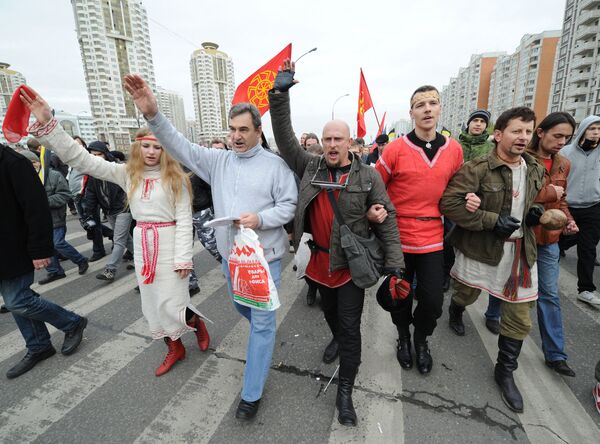More than 32,000 people took part in Moscow’s public celebrations of National Unity Day, which included events ranging from neo-Nazi marches to antifascist rallies in different parts of the city.
Neo-Nazis and far-right nationalists marched through working-class Lyublino neighborhood on the outskirts of the capital, chanting "Russia for Russians, Europe for Whites!" and calling on ethnic Russians to "take back" Russia.
Organizers had predicted that 25,000 people would show up at the march. But a police spokesman told RIA Novosti news that around 7,000 people took part.
The nationalist Russian March was held amid rising resentment over the influx of migrants from Russia's North Caucasus.
Another 15,000 people took part in a separate Russian March organized by the pro-Kremlin group Nashi in the Soviet-era All-Russian Exhibition Center (VVTs), a RIA Novosti correspondent reported.
“This marsh is not an alternative to the Russian March which is now being held in Lyublino,” a spokesman for Nashi said. “This is the only genuine Russian March as many peoples that have glorified our country are taking part in it,” he added.
The participants of the march chanted “I love Russia” and the names of the cities they hailed from. Nashi said they had invited everyone “who has Russian passport, knows Russian language, abides the country’s laws and wants to live in Russia despite his or her ethnicity.”
Ruling United Russia party held an own public event in Moscow’s Poklonnaya Gora park. It gathered about 10,000 participants, police said.
About 500 young Russians paraded along Moscow’s Taras Shevchenko Embankment near Kievsky Station in an antifascist march to mark the National Unity Day.
According to police, no serious incidents were spotted during the celebrations in Moscow.
National Unity Day was introduced by the Kremlin in 2005 to replace the communist holiday of November 7 celebrating the 1917 Bolshevik Revolution.
November 4 was chosen as the date of the liberation of Russia from Polish invaders in 1612, but according to a survey held in 2010 most Russians struggle to name the reason for the celebration.
The country, however, is used to an extra day off in November since the 7th day of the month was an annual celebration of the October Socialist Revolution of 1917.
The October revolution, despite its name, has always been celebrated in November, as Russia switched to the Gregorian calendar in 1918.


